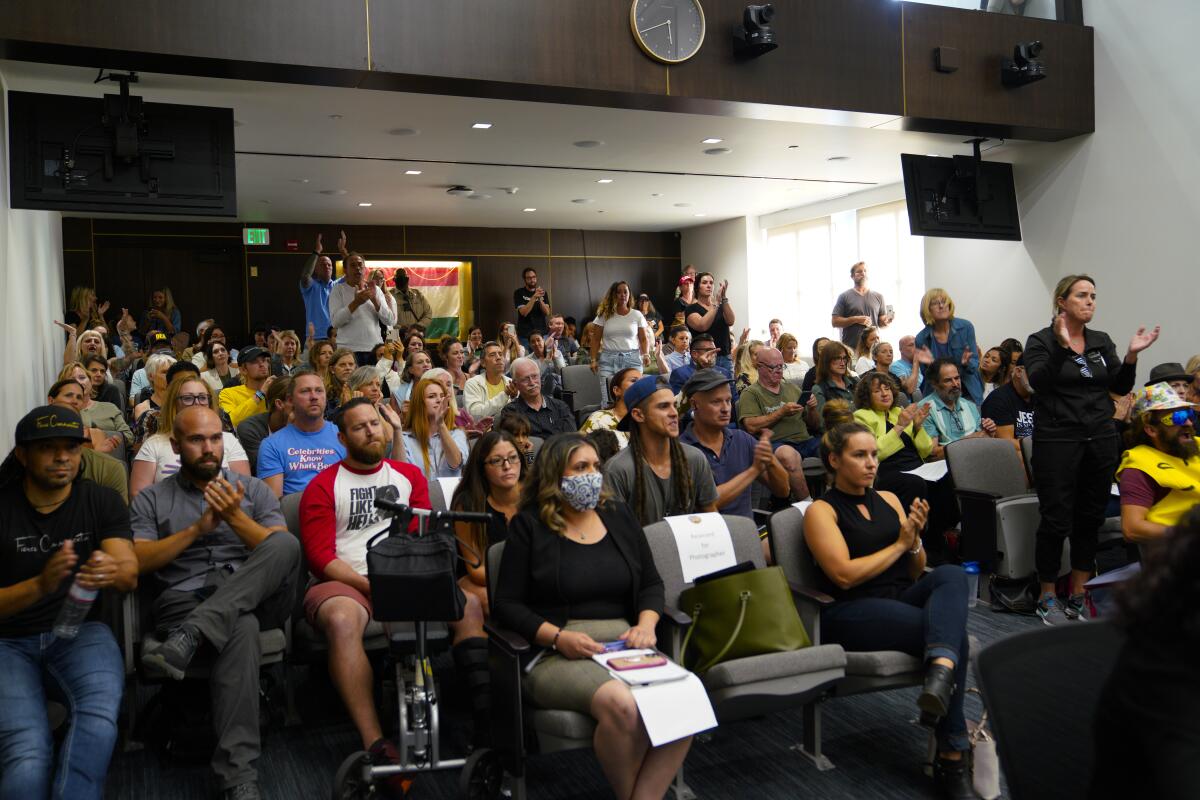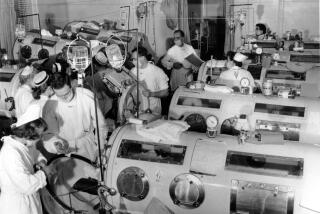San Diego Countyâs campaign to fight medical falsehoods gains momentum

SAN DIEGO â The hundreds who lined up last week to condemn a San Diego County Board of Supervisors resolution declaring medical misinformation a public health crisis argued it was an attempt to stifle free speech.
But the nationâs public health community appears to be rallying around the boardâs unprecedented 3-2 decision to challenge what it says is a growing body of COVID-19 falsehoods that are eroding confidence in vaccines and perpetuating the spread of the coronavirus.
Tuesdayâs decision directly referenced âConfronting Health Misinformation,â a recent treatise designed âto help slow the spread of health misinformation during the COVID-19 pandemicâ endorsed by Dr. Vivek Murthy, the U.S. surgeon general.
After learning of the vote, which was believed to be the first such action by a local government in the nation, Murthy tweeted his support, congratulating board Chair Nathan Fletcher for taking âthe kind of bold action we need to ensure we all have accurate, science-based information.â
Is this the start of something bigger than San Diego? It appears so. On Friday, the state Assembly passed a similar resolution sponsored by Assemblywoman Akilah Weber (D-San Diego), and Monterey County appears poised to take similar steps.
And the decision is getting national attention beyond the surgeon generalâs office.
Dr. Georges Benjamin, executive director of the American Public Health Assn., said too many continue to reject the scientific consensus around the efficacy of vaccines and turn instead to unproven and potentially dangerous treatments such as the anti-parasite medication ivermectin.
Benjamin, speaking from Washington, said the idea of calling out misinformation is not a new concept in public health. As vaccination skepticism has raged this year, an old comic repeatedly made the rounds on social media showing four blind or blindfolded men named âAnti-vaccinationist,â âFaddist,â âMr. Carelessâ and âAnti-everythingâ walking hand in hand off a cliff labeled âmisinformation,â which looms over a body of water named âsmallpox.â
Benjamin said the comic is authentic and was included in a 1930 public health association booklet titled âHealth in Pictures.â According to the fact-checking site Snopes.com, an original copy of the 91-year-old document was found in the American Public Health Assn.âs paper archives when the internet debunker sought to verify its provenance.
So the idea of an organization getting creative to call out misinformation is not exactly new.
But a local government doing so? That appears to be significantly more rare.
Dr. Howard Markel, a pediatrician and director of the Center for the History of Medicine at the University of Michigan, said he could think of no precedent for San Diego Countyâs recent misinformation decision.
âThere is not a historical example, that I know of, in the United States from 1890 to 2019 where a local or state government had to go out and vote on something like this,â Markel said.
Itâs hard to say, though, exactly what kind of result the action will have on the public. Comparing it, Markel said, to previous landmark public health statements such as the surgeon generalâs 1957 public statement linking cigarette smoking to lung cancer, is like comparing a paper airplane to a helicopter. The speed and spread of todayâs social media allow a half-truth to make its way from smartphone screen to smartphone screen and mutate into a million memes in ways never seen before.
âThis era that we are in is new, and there really is no valid precedent,â Markel said. âIn the history of pandemic responses, there is just nothing like this. History is no longer a good guide.â
Many of those who spoke at Tuesdayâs ultra-marathon public meeting, which had supervisors casting their votes past midnight, called the action an attempt to violate their 1st Amendment rights to free speech.
Legal experts, though, said they saw no such attempt to stifle residentsâ freedom to say what they want, where they want, when they want, without government sanction.
After examining the text of the decision, Michael McConnell, director of the Stanford Constitutional Law Center at Stanford University, said that a violation of the 1st Amendment would entail the government attempting to somehow punish those who spread misinformation. Simply laying out plans to publish rebuttals to information that others publish, he said, does not meet that standard.
âThe 1st Amendment has to do with the government trying to stop people from being able to speak out,â McConnell said. âNot a single one of those policies, at least as far as I can see, has anything to do with suppressing free speech.â
Wendy Parmet, a professor of law, public policy and urban affairs at Northeastern University in Boston, agreed.
âThe 1st Amendment does not limit the governmentâs ability to counter misinformation or focus on the dissemination of truthful information,â she said.
Of course, it will clearly be difficult for government agencies to reach those who oppose every aspect of the pandemic response. Many who spoke Tuesday cited the governmentâs changing advice on the use of face coverings and medical masks, first saying they were not necessary and then mandating them as essential.
Markel, the Michigan health historian, said that much of the work of anyone who seeks to reverse public perceptions around pandemic concerns will need to be able to explain such changes, which are always common in pandemics. Early mask advice, he noted, was largely based on how other viruses, such as influenza, behave.
Because it was so new, there simply had not been much time to study how masking might affect the spread of the pathogen that has now so stubbornly remained active across the globe even as hundreds of millions are vaccinated.
Any attempt to battle misinformation, Markel said, needs to address this trust issue over changing public health advice head-on. The public, he said, needs to understand that this is how science works. Approaches should be expected to change as researchers have time to do rigorous research. After all, itâs certainly what individuals expect when they fall ill.
âIf a doctor makes a decision on how to treat their patient in the morning and that patient has lost two liters of blood by the afternoon, thatâs data that you would want them to react to,â he said. âThat doctor-patient relationship, writ large, is the public health relationship, only youâre dealing with the health of the entire community, not just one individual.â
Addressing these kinds of issues is what the countyâs misinformation vote seems structured to accomplish, calling for research on the most-commonly-cited misinformation and for a county-run website that could serve as a clearinghouse for accurate pandemic facts.
As a Google search shows, though, the accurate facts are out there, listed over and over again on reputable websites. A copy-and-paste is really all thatâs needed for anyone in the world to find rebuttals to any assertion.
State medical boards are warning doctors not to spread COVID falsehoods, but will that stop them?
The problem for the San Diego County Board of Supervisors â or any local government â has been that the public comment portion of each of its meetings provides a perfect venue for anyone to line up and say whatever they want for two minutes each.
There are no plans to change the open-comment format, and it is unclear whether the board intends to agendize fact-checking as part of its formal proceedings, injecting rebuttals into the same venue that has recently become the most-visible misinformation megaphone in the community.
Benjamin, the public health association director, said he will be following how San Diego County goes about finding its voice.
âIt is clear that there is harm being done when people are dying because they didnât get vaccinated or didnât take precautions because they listened to the plethora of misinformation thatâs going around out there,â Benjamin said. âBut when you make those kinds of health declarations, the next question is, âWell, what will you do about it?â
âHopefully, we will see more decisions like this. Iâd like to see public health people more engaged in making sure the public is getting the correct information.â
More to Read
Sign up for Essential California
The most important California stories and recommendations in your inbox every morning.
You may occasionally receive promotional content from the Los Angeles Times.












